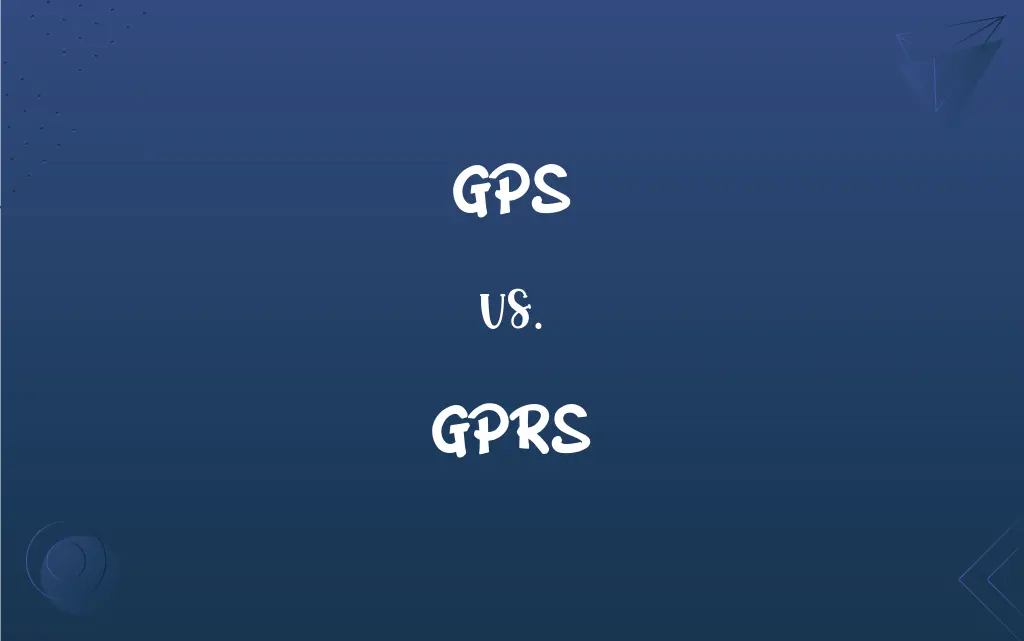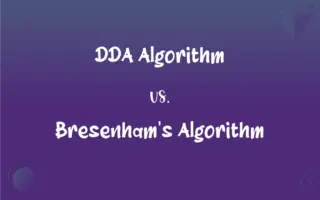GPS vs. GPRS: What's the Difference?
Edited by Aimie Carlson || By Janet White || Published on February 29, 2024
GPS (Global Positioning System) is a satellite-based navigation system providing location and time information, while GPRS (General Packet Radio Service) is a mobile data standard for wireless communication.

Key Differences
GPS, the Global Positioning System, is primarily used for determining geographical location anywhere on Earth through satellites. GPRS, or General Packet Radio Service, is a standard for mobile data communication, enabling internet access and multimedia messaging on mobile devices.
GPS operates through a network of satellites orbiting the Earth, providing accurate location and time data to GPS receivers. GPRS, on the other hand, is integrated into cellular network infrastructure, allowing for the transmission of data over these networks.
The primary use of GPS is in navigation systems, allowing for precise location tracking for vehicles, smartphones, and other devices. GPRS is used for various mobile data services like web browsing, sending emails, and multimedia messages over mobile networks.
GPS provides high accuracy in location tracking, essential for applications like mapping, surveying, and geolocation services. GPRS offers reliable data transfer, but its speed and efficiency are lower compared to newer mobile data technologies.
GPS has evolved to offer high-precision capabilities and is a critical component in many modern technologies. GPRS, introduced as an improvement over 2G, served as a stepping stone to faster mobile data standards like 3G and 4G.
ADVERTISEMENT
Comparison Chart
Primary Function
Satellite-based location tracking
Mobile data communication
Technology Base
Network of Earth-orbiting satellites
Cellular network infrastructure
Main Uses
Navigation, mapping, timing
Internet access, MMS, mobile communication
Accuracy
High precision in location
Reliable but slower data transfer
Evolution
Continual improvement in precision
Bridge between 2G and more advanced data standards
ADVERTISEMENT
GPS and GPRS Definitions
GPS
GPS is a satellite-based system providing precise location and time information globally.
I used GPS to navigate through the unfamiliar city streets.
GPRS
GPRS allows for the transmission of data like web browsing and multimedia messages.
Sending pictures via MMS is possible because of GPRS technology.
GPS
GPS receivers calculate their exact location by triangulating signals from multiple satellites.
Hikers use GPS devices to determine their location in remote areas.
GPRS
GPRS represents an evolution from traditional circuit-switched mobile communication.
GPRS improved my phone's internet speed compared to the older 2G network.
GPS
GPS is essential for modern navigation systems in vehicles, aircraft, and maritime.
The pilot relied on GPS for accurate flight navigation.
GPRS
GPRS offers moderate data speeds and is widely used in areas without 3G or 4G coverage.
In remote areas, GPRS provides essential internet connectivity.
GPS
GPS technology enables real-time positioning and tracking for various applications.
Our delivery trucks are equipped with GPS for efficient route planning.
GPRS
GPRS is a packet-switched technology for wireless data communication over cellular networks.
I accessed my emails on the move using GPRS on my phone.
GPS
GPS has applications beyond navigation, including time synchronization and surveying.
The construction company used GPS for precise land surveying.
GPRS
GPRS serves as a foundational technology for mobile internet and data services.
Using GPRS, I could check live weather updates on my mobile.
GPS
A navigational system involving satellites and computers that can determine the latitude and longitude of a receiver on Earth by computing the time difference for signals from different satellites to reach the receiver
FAQs
Can GPS work without an internet connection?
Yes, GPS does not require an internet connection to provide location information.
Is GPRS still used today?
Yes, GPRS is still in use, especially in regions with limited access to more advanced network technologies.
What does GPS stand for?
GPS stands for Global Positioning System.
What is the main purpose of GPRS?
GPRS is used for mobile data communication, including internet access and multimedia messaging.
How accurate is GPS?
GPS can typically provide location accuracy within a few meters.
Does GPRS support voice calls?
Yes, GPRS can support voice calls alongside data transmission.
What technology does GPS use for locating positions?
GPS uses signals from satellites to triangulate a receiver's position.
Do all smartphones have GPS capability?
Most modern smartphones come equipped with GPS functionality.
Is GPS used for timing synchronization?
Yes, GPS provides precise timing signals used in various applications.
What speeds can GPRS provide?
GPRS offers data speeds of up to 114 kbps, which is slower compared to newer technologies.
Can GPRS be used globally?
GPRS can be used globally, provided there is cellular network coverage.
How does weather affect GPS accuracy?
GPS accuracy is generally not significantly affected by weather.
Is GPRS secure for data transmission?
GPRS has security protocols, but it's not as secure as newer network technologies.
Can GPRS be used for streaming video?
GPRS can stream video, but its slower speeds might result in lower quality and buffering.
Can GPS be used indoors?
GPS signals can be weak indoors, making it less effective than in open areas.
Can GPS track movement in real-time?
Yes, GPS can track movements in real-time for navigation and tracking purposes.
What are the applications of GPS in everyday life?
GPS is widely used for navigation in cars, smartphones, and for outdoor activities like hiking.
How does GPRS work?
GPRS transmits data in a packet-switched format over cellular networks.
Does GPRS require a specific type of phone?
GPRS works on most modern mobile phones that support 2G networks.
Is GPRS faster than 3G?
No, GPRS is slower than 3G and subsequent mobile data technologies.
About Author
Written by
Janet WhiteJanet White has been an esteemed writer and blogger for Difference Wiki. Holding a Master's degree in Science and Medical Journalism from the prestigious Boston University, she has consistently demonstrated her expertise and passion for her field. When she's not immersed in her work, Janet relishes her time exercising, delving into a good book, and cherishing moments with friends and family.
Edited by
Aimie CarlsonAimie Carlson, holding a master's degree in English literature, is a fervent English language enthusiast. She lends her writing talents to Difference Wiki, a prominent website that specializes in comparisons, offering readers insightful analyses that both captivate and inform.































































